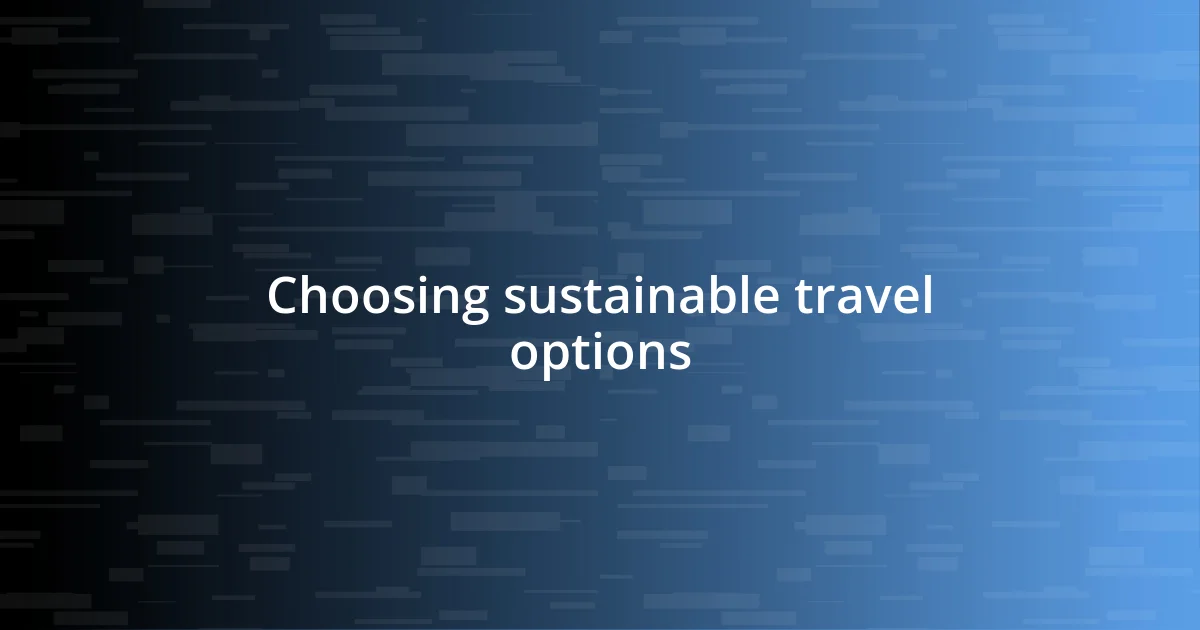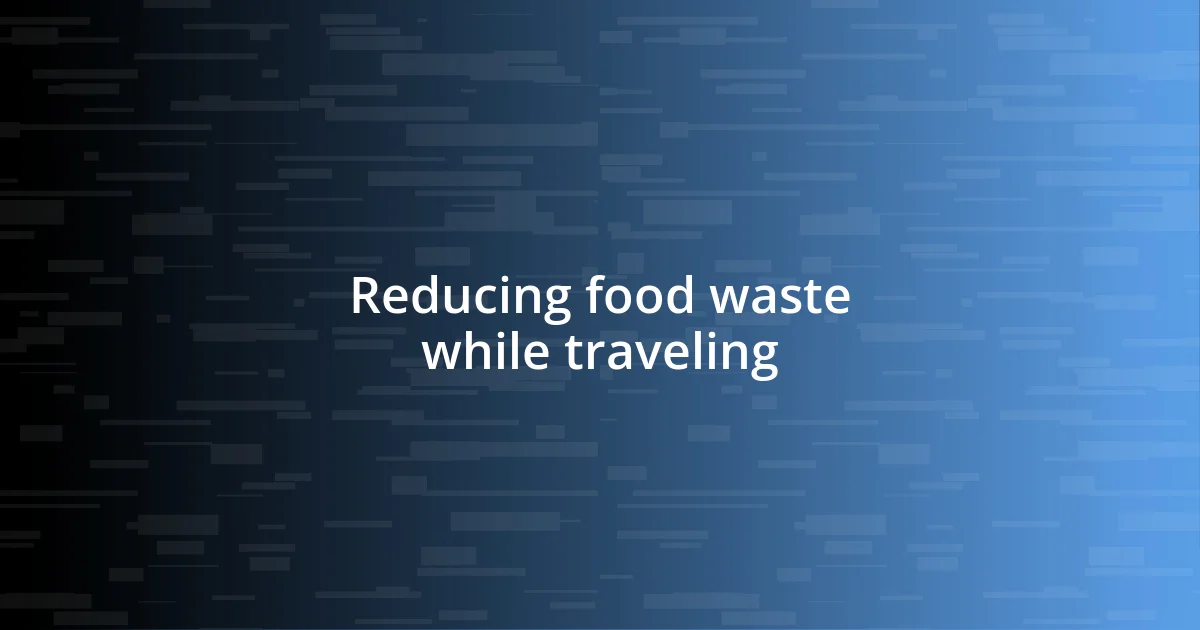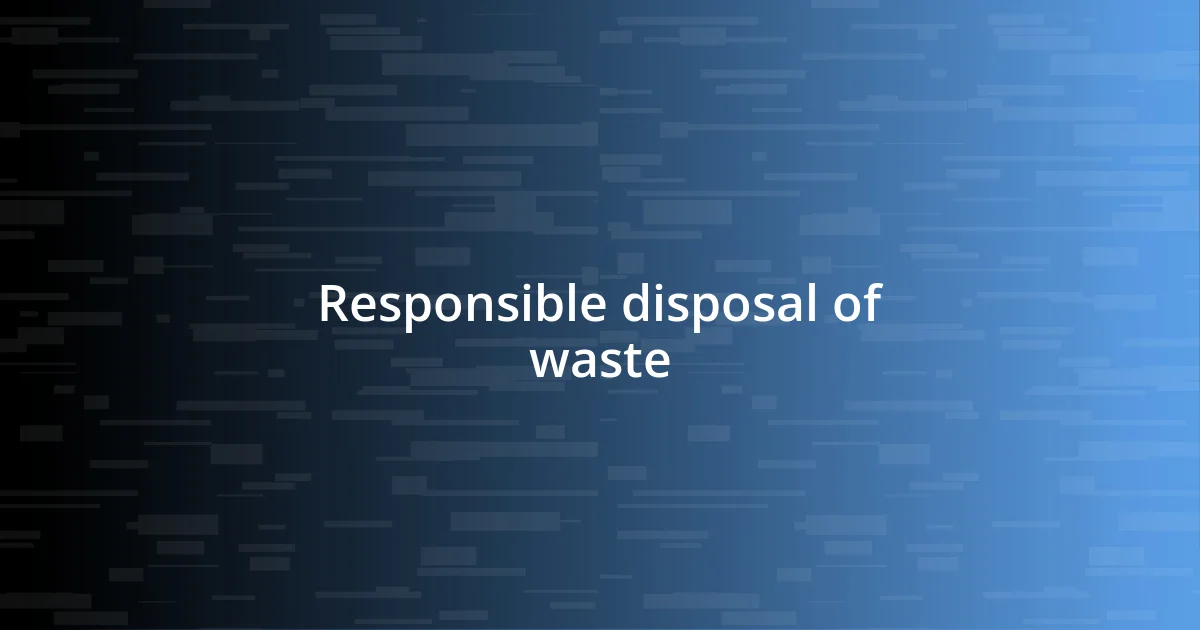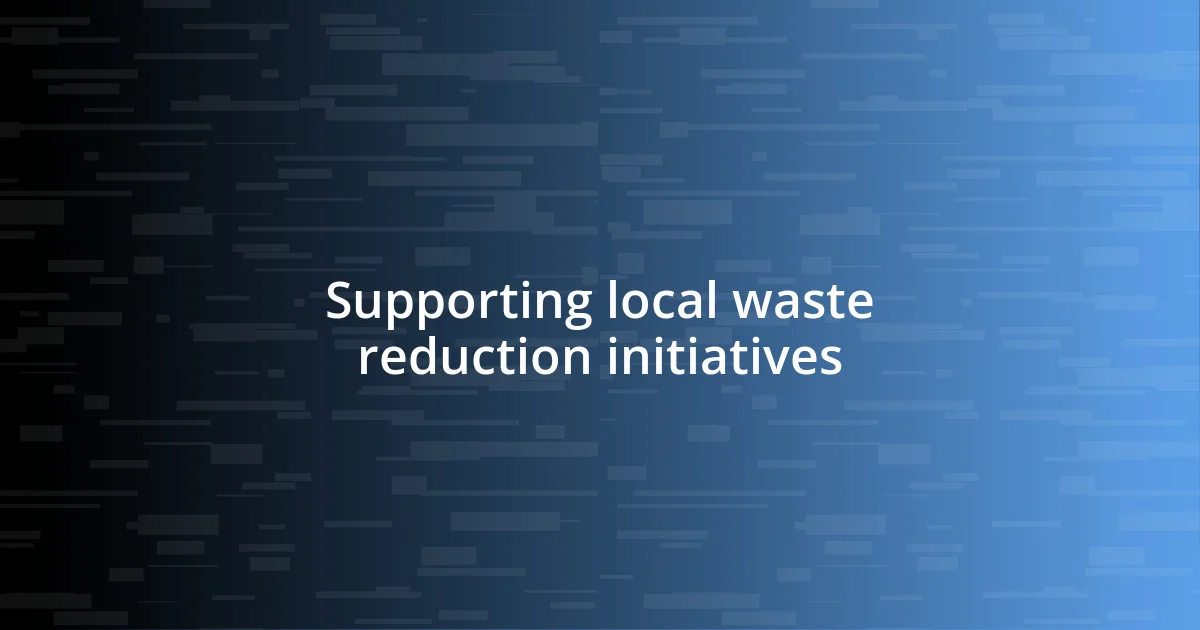Key takeaways:
- Travel-related waste is significant and includes both physical garbage and carbon footprints from transportation, highlighting the need for conscious practices.
- Choosing sustainable travel options—like train travel, eco-friendly accommodations, and local transportation—can greatly reduce environmental impact.
- Supporting local waste reduction initiatives and responsible disposal practices fosters community connection and enhances travel experiences while protecting the environment.

Understanding travel-related waste
Travel-related waste is a staggering problem that often goes unnoticed until we step back and look at the bigger picture. When I went backpacking through Southeast Asia, I was shocked by the sheer volume of plastic waste littering the beautiful landscapes. It made me wonder—how can something so beautiful coexist with such environmental destruction?
Every little choice contributes to this waste, from the single-use plastic bottles we grab at the airport to the excess packaging surrounding local snacks. I can recall a moment when I visited a remote village and noticed locals using reusable bags and containers. It struck me how simple habits can make a significant difference. Isn’t it inspiring to think we could adopt similar practices while we travel?
Furthermore, travel-related waste extends beyond physical garbage; it includes carbon footprints from our transportation choices and excessive energy use in hotels. I remember feeling overwhelmed by the energy consumption of a massive hotel I stayed in, only to find out they had a recycling program that few guests utilized. What if we made it a point to not only reduce what we throw away but also to be conscious of our overall environmental impact? Each small change can lead to monumental differences if we all commit to it.

Importance of reducing waste
Reducing waste is crucial not just for our planet but also for the quality of travel experiences. I remember a trip to a national park where the beauty of nature was marred by litter. It was disheartening to see trash in such pristine surroundings. In that moment, I realized that our travels have the power to both uplift and harm ecosystems. By choosing to minimize our waste, we can protect these stunning landscapes for future generations and create a more enjoyable experience for ourselves and fellow travelers.
Here are a few reasons why reducing waste while traveling matters:
- Preserving natural resources: Less waste means less demand for raw materials, which helps protect the environment.
- Enhancing local cultures: Supporting sustainable practices can boost local economies and promote cultural preservation.
- Mitigating climate change: Every item we eliminate from our travel waste contributes to lowering greenhouse gas emissions.
- Improving health: Reducing waste leads to cleaner environments, which benefits both wildlife and communities.

Choosing sustainable travel options
Choosing sustainable travel options requires us to be mindful of our choices at every stage of our journey. During a trip to Europe, I decided to take trains instead of flying. The experience was not only scenic but also significantly reduced my carbon footprint. Have you ever tried traveling by train through picturesque landscapes? It feels like a different world, one that invites you to appreciate your surroundings while being kind to the planet.
Moreover, selecting accommodations that prioritize sustainability can dramatically impact your overall travel waste. I remember staying at a small, eco-friendly hotel where they encouraged guests to limit towel changes and offered organic toiletries. It felt great knowing that even my stay was contributing to environmental preservation. Don’t underestimate the power of your lodging choice; it’s often one of the most impactful decisions you can make.
Finally, consider the local transportation options. In many cities, biking or walking not only enhances the travel experience but also helps cut down on emissions. I often stroll through bustling streets, immersing myself in the local culture while minimizing my environmental impact. What have you noticed about your surroundings when you choose to wander on foot instead of rushing by car or bus? Those little moments can be some of the most rewarding aspects of travel.
| Travel Option | Environmental Impact |
|---|---|
| Train Travel | Lower carbon emissions and a more scenic experience. |
| Eco-friendly Accommodations | Support sustainable practices, reducing overall waste. |
| Biking/Walking | Promotes local exploration and cuts down on fossil fuels. |

Packing eco-friendly essentials
When packing for my travels, I’ve found that choosing eco-friendly essentials can make a significant difference. For instance, I always reach for my reusable water bottle instead of disposable ones. Each time I refill it, I can’t help but feel a sense of accomplishment, knowing I’m reducing plastic waste and staying hydrated on my adventures.
I also love to take along a set of beeswax wraps instead of plastic wrap. They’re not only biodegradable but also quite charming! I vividly recall a picnic I had at the beach where I used these wraps to store my sandwiches. When I unveiled my meal, I felt a small surge of joy seeing my food nestled responsibly, free from plastic. Have you ever noticed how these little choices can transform your travel experience into something much more meaningful?
Don’t forget about packing your own utensils and dishware. On a recent trip, I brought a lightweight set of bamboo cutlery. It felt great to enjoy meals without contributing to the throwaway culture that often accompanies travel. As I savored each bite, I was reminded of the impact my choices have—not only on the environment but also on my overall experience. It’s moments like these that make me believe we can turn our travels into a force for good.

Reducing food waste while traveling
Reducing food waste while traveling is all about being intentional with our choices. I remember one trip where, instead of dining out for every meal, I sought local markets. There’s something magical about wandering through stalls filled with fresh produce and local delicacies. Have you ever considered that by cooking your own meals, you not only reduce food waste but also experience a deeper connection with the local culture? The flavors and aromas were so vibrant; it made my meals truly unforgettable.
Whenever I find myself at a restaurant, I make it a point to check the portion sizes before ordering. In Italy, I encountered a delightful little trattoria where I opted for a smaller dish and shared it with a friend. Not only did this prevent leftovers from going uneaten, but it also allowed us to try more dishes together. Isn’t it interesting how sharing can transform the dining experience? Each bite felt more meaningful, and we even bonded over our conversation about the ingredients and flavors.
Another strategy I’ve embraced is to befriend “doggy bags.” On one memorable evening in Thailand, after savoring a delicious curry, I asked for my leftovers to go. I was pleasantly surprised to discover that many local places encourage this practice. It not only gave me a second delightful meal, but it also reduced the amount of food that would otherwise go to waste. Have you ever been on the fence about asking for a takeout container? Trust me, it can feel rewarding to prolong the enjoyment of what you’ve tasted while being a bit kinder to the planet.

Responsible disposal of waste
Responsible disposal of waste is essential for leaving a positive mark on the places we visit. I recall a trip to a national park where I saw signs encouraging visitors to “pack it in, pack it out.” It struck me then how vital it is to take responsibility for our waste. Have you ever felt that twinge of guilt when you see litter in a beautiful area? I certainly have, and it inspires me to be more vigilant about disposing of my waste properly.
When it comes to disposal, I’ve learned that finding the right receptacles is key. On a recent urban adventure, I was pleasantly surprised by how many recycling bins there were in the city. It felt empowering to sort my discarded items, knowing I was contributing to a more sustainable environment. Have you ever noticed how simple actions like this can create a ripple effect? Seeing others do it too convinced me that responsible waste disposal is truly a communal effort.
I also make it a point to research local waste disposal guidelines before I travel. On one occasion in a coastal town, I discovered that certain beaches had designated bins for biodegradable waste. It felt fantastic to compost my leftover fruit peels while basking in the sun, knowing I was supporting the local ecosystem. Isn’t it reassuring to know that, by being informed, we can all play a role in preserving the beauty of our surroundings?

Supporting local waste reduction initiatives
Supporting local waste reduction initiatives can be incredibly rewarding. When I volunteered with a community cleanup in a small coastal town, I felt a deep sense of connection to the place and its people. Have you experienced that rush of fulfillment when you actively contribute to something larger than yourself? It’s like the simple act of picking up trash spoke to my commitment to love and respect nature.
I’ve also seen how local businesses thrive when they prioritize waste reduction. On a recent trip, I wandered into a café that served beverages in reusable cups and offered discounts to customers who brought their own containers. It really struck me: supporting these initiatives not only reduces waste but bolsters the community’s economy as well. Wouldn’t it be wonderful if more places adopted this practice? It opens up a dialogue about sustainability that feels inclusive and inspiring.
Attending workshops on sustainable practices in local communities has also enriched my travels. Once, I participated in a seminar about composting and realized how much I could learn from locals about waste management. Each story shared made the concept come alive, and I couldn’t help but think, how unique it is to integrate local wisdom into our travel experiences. Taking part in such initiatives not only educates me but also fosters a sense of belonging, transforming my journeys into meaningful adventures.












